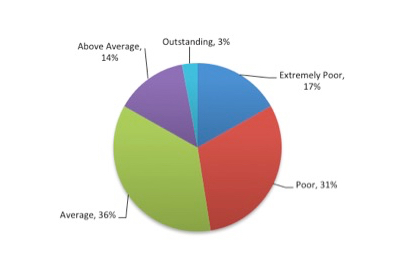
Image by: SIphotography, ©2017 Getty Images
There is a lot of noise today about information governance (IG). I say noise because, at times, that is what it sounds like—lots of folks talking about IG this and IG that and lots of executives saying they support IG, but what is really happening out there?
A recent AIIM Industry Watch report titled “Governance and Compliance in 2017: A Real World View” found that only three percent of our respondents cite their IG policies as being outstanding, with 17% of respondents rating the maturity level of their IG policies as extremely poor. When asked about data loss or challenges in finding information in the past 12 months, 10% of respondents report data loss due to staff negligence or bad practices, while eight percent say they could not find the records they required for litigation.

In a recent AIIM Industry Watch report, respondents were asked to rate the maturity of their company’s information governance (IG) policies on a scale of 1 to 5 (1 being poor and 5 being outstanding).
Source: AIIM Industry Watch report “Governance and Compliance in 2017: A Real World View.” August, 2017.
This same report found that IG is placed high on the executives' agenda and is supposedly the focus of their attention. Yet, when we asked if employees are being trained in IG, just over a third indicate that they receive no training at all, while a quarter say it happens periodically. So, if this is a priority, you have to ask the question, "How important is IG, really?
In My View
Information governance is most definitely important and should be given priority, as it is the foundation of the information ecosystem. It provides a framework for how we create, capture, manage, preserve, store, distribute, and destroy our information. It provides guidance on the tools we use to get the job done, standards we follow across the enterprise, and how we maintain compliance with legal and regulatory statutes.Ok, now I am sounding like a preacher on the soapbox, but I can tell you that if you have a solid IG framework in place—one that not only addresses the needs of today but also is designed for the future—you will find that things can operate more smoothly. IG is important and deserves more than to be glossed over. Instead, it should be embedded into the organizational culture as a constant practice. It is time for your business to turn that "maybe" into a "definitely" when it comes to IG. Think about it.
Bob Larrivee is Vice President and Chief Analyst of Market Intelligence at AIIM and an internationally recognized subject matter expert and thought leader with over 30 years of experience in the fields of information and process management. Follow him on Twitter @BobLarrivee.







